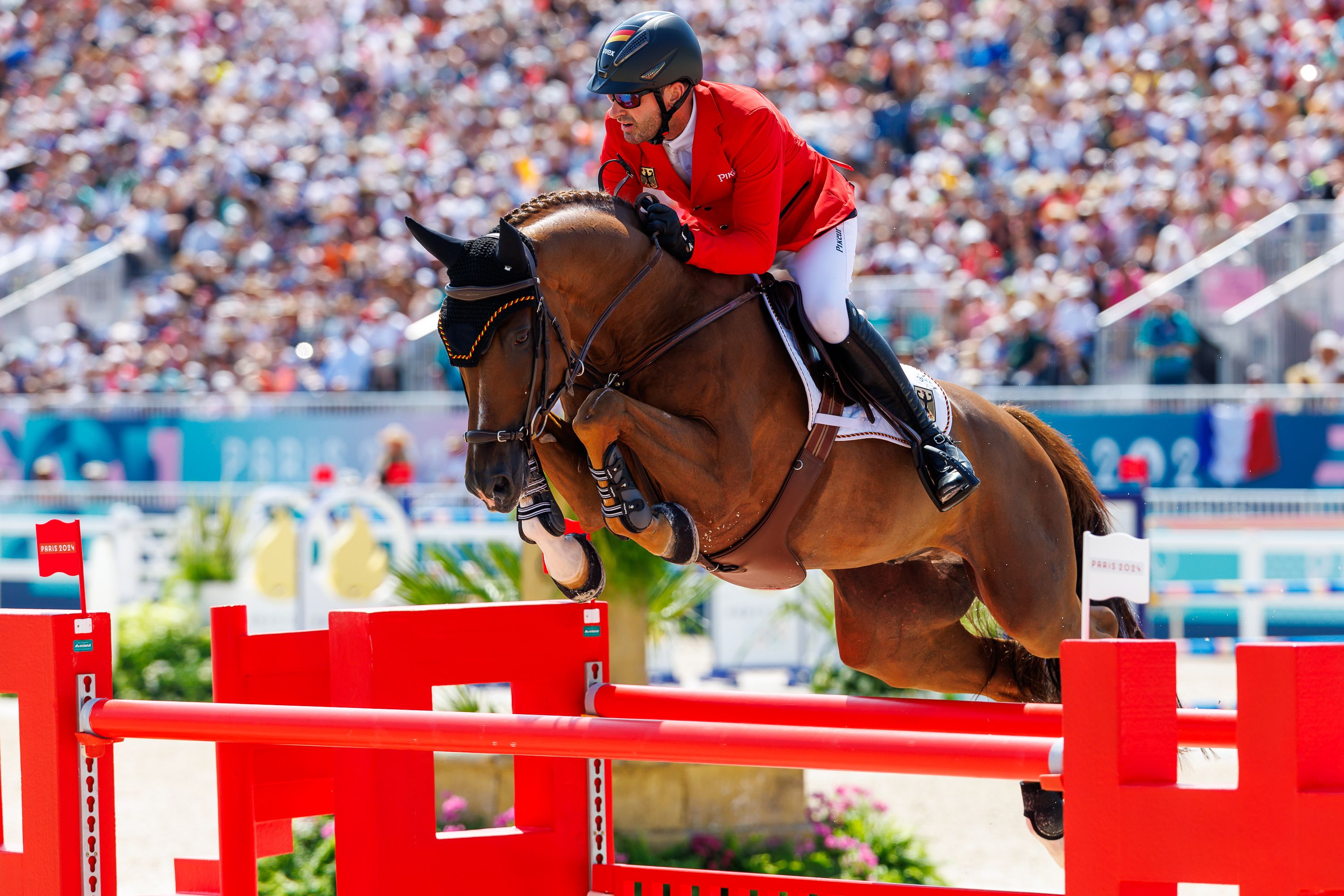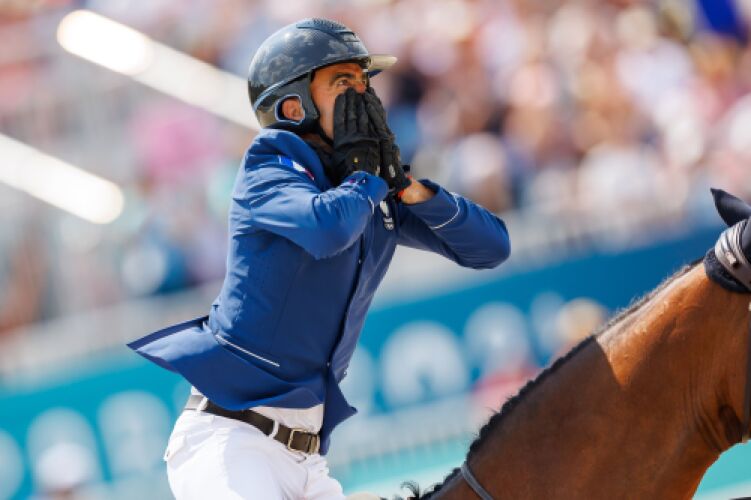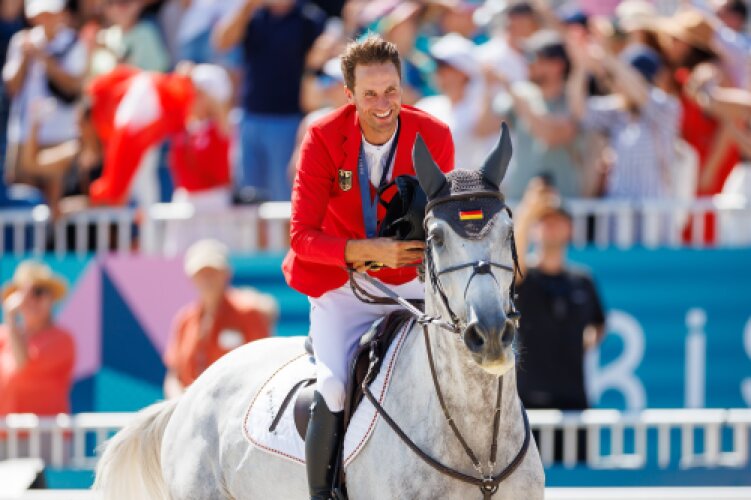Team Germany cruised to the top of the team standings without a blemish on their scoresheet to book the coveted last-to-go spot on tomorrow’s startlist for the Jumping Team Final at the Paris 2024 Olympic Games in Versailles (FRA) today.
Superb clear rounds from all three of the German combinations – Christian Kukuk with Checker, Phillip Weishaupt on Zineday and Richard Vogel with United Touch – produced the only zero score on a day when the bright and beautifully-designed course presented by Spain’s Santiago Varela and Gregory Bodo from France kept the athletes laser-focused and the horses very happy.
Of the 20 nations chasing down just 10 qualifying spots in tomorrow’s team medal decider it was the USA that finished second with just six faults, while Great Britain, Belgium and The Netherlands filled the next three slots with eight faults apiece. Ireland finished sixth with nine faults and the hosts from France finished seventh when putting 12 faults on the board.
There were a few surprises however. The defending Olympic champions from Sweden looked set to join the Germans at the top of the leaderboard until a miscommunication between Peder Fredricson and his brilliant grey gelding Catch Me Not S led to a glance-off at the Graffiti Wall at fence 11. And when they also clipped the middle-element of the penultimate triple combination the resulting 17 faults saw the Swedes land in eighth place, well within the qualified group but a lot lower than expected.
Even more surprising were the 24 faults collected by Team Switzerland who are out of team contention after picking up 24 faults to finish 12th. Instead, the last two qualifying spots went to Israel and Mexico, both on 20, with Team Spain squeezed out by a single time penalty to finish 11th at the end of the day.
First clear
The reigning double world champions and Tokyo 2020 team gold medallists Henrik von Eckermann and the great King Edward were first to clear the course when fifth to go. The 14-year-old gelding normally jumps barefoot, but had front shoes fitted especially for the Games. However, when he lost one en route around the 14-fence track today, von Eckermann has decided to leave him without shoes again for the rest of the Games.
The Swede described King Edward as “a genius of a horse!”. He said he himself wasn’t too relaxed before the competition began but was delighted with the outcome.
“I always think the first track is the worst one because you're not really sure. I mean I know my horse very, very well, but still, you never know - it’s animals, not machines, and you just want to have a good feeling, and you don't know how it is going to be before you do it!”
“We know each other very well, and, and I know exactly how to support him. For example, at fence number two I was little bit too deep to the oxer, so he went really high, and then he froze a little bit because he's very careful. If I wouldn't have that trust that we work with then it could have been a bit of a disaster, but he knows what to do and I support him and it's a fantastic feeling together!”, he explained.
Defending individual champion, Great Britain’s Ben Maher and Dallas Vegas Batilly, plus Christian Kukuk and Checker 47, America’s Laura Kraut and Baloutinue, The Netherlands’ Mikael van der Vleuten and Beauville Z and Brazil’s Pedro Veniss and Nimrod de Muze also left the course intact. However, in accordance with the rules, the Brazilian pair were eliminated when a small amount of blood was found on the horse’s side after he left the arena.
Eye-catching
Last to go in the first group of 20 competitors today was the eye-catching Ermitage Kalone who, despite being only a 10-year-old, soared around the course with the greatest of ease for Belgium’s Gilles Thomas. With just single errors from team-mates Wilm Vermeier/IQ van het Steentje and Jerome Guery/Quel Homme de Hus, the Belgians comfortably qualified for tomorrow’s final team test, sandwiched between the British and the Dutch.
For Britain’s Maher it was just a relief to get the competition started. “There has been a lot of waiting around and not knowing what's coming in the first round, but it's a big enough test today and Dallas Vegas was listening and really on point for me so I’m happy”, he said.
“Normally at these events there's always some different fences and we already see that today. I don't know what the other riders are saying but things are coming quick enough today, it’s quite careful jumping and there are no second chances this week!”
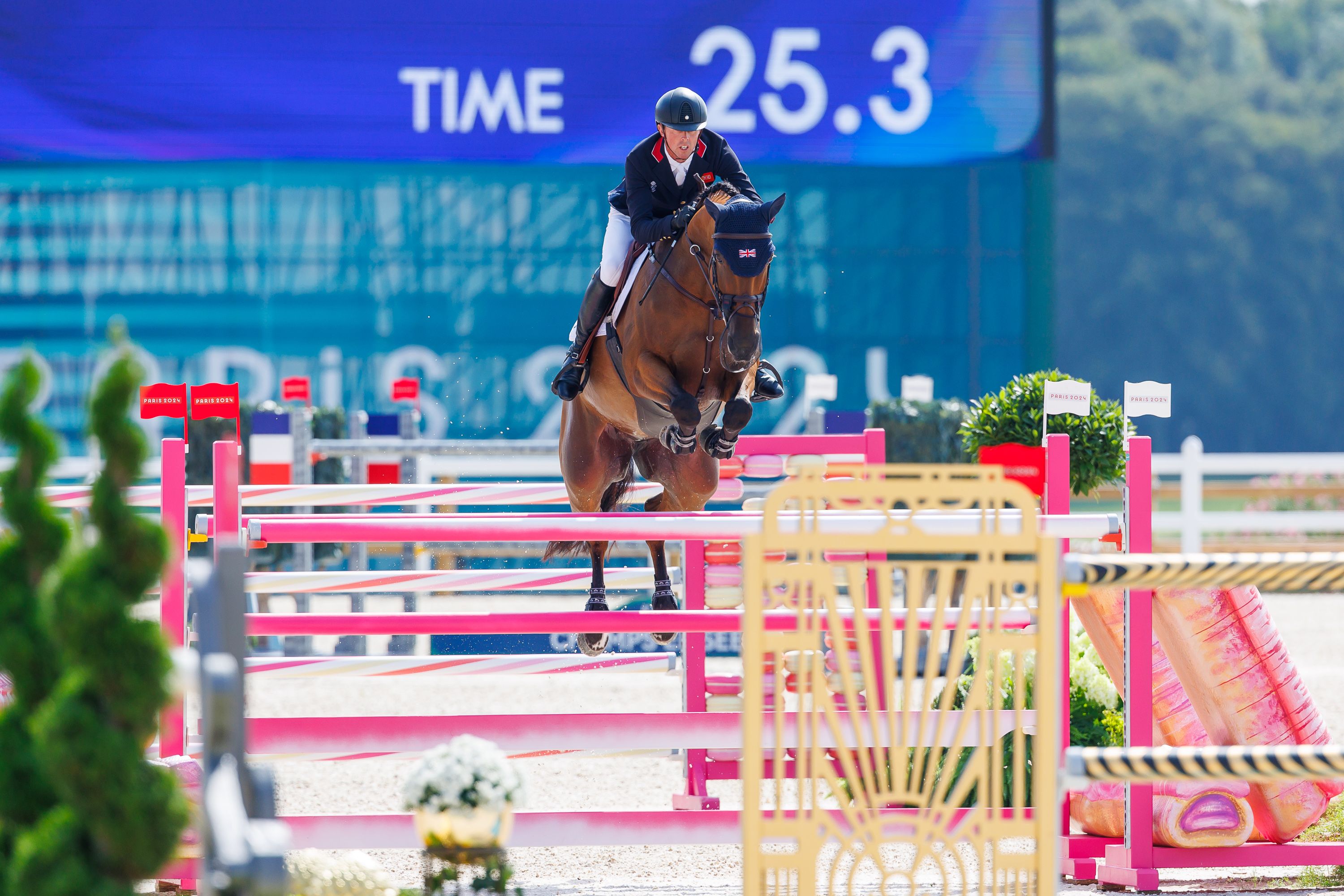
By far the most influential fence on the course was the penultimate triple combination, with eight horses lowering the vertical on the way in and 24 of the 57 starters kicking out the narrow plank on top of the middle element. It was there that Maher’s team-mate Harry Charles picked up his four faults with Romeo, but he was feeling mighty grateful that he is competing in Paris at all this week after fracturing his right wrist in a fall in Aachen (GER) a few weeks ago.
Fortunately, his father Peter is a former European Jumping champion and could keep Romeo ticking over while his rider spent a short time recovering. “When I got home, I was wearing a brace and I decided that if I could ride at Hickstead last week that I could ride the Olympics. I got back on Romeo 10 days ago and it worked well, no pain, so I said OK we're fine, and that was that, happy days!” Charles explained.
Big stage
His team-mate Scott Brash knows a thing or two about riding on the big stage and was a member of that historic British side that took team gold on home ground in London in 2012. Brash and Jefferson also faulted at that penultimate triple combination, but at the first element this time.
“I was maybe a smidgen too deep and he just touched it on the way up, so maybe it was my fault a bit. I think it was quite an unlucky fault really, so you learn from that ahead of tomorrow, but I was really delighted with how he jumped everything else. He felt like he skipped around!”, he said. Brash took a more careful line to the wall at nine that led to Sweden’s Fredricson running up a big score because it flashed up on a screen before he got up on his own horse. That unlikely incident was a reminder that when it comes to horses you can never be absolutely sure what is going to happen next.
“I mean it just shows you - Catch Me is 18 years old, he knows his job, he’s a great horse and he's seen so many walls. You’d never expect it . . . so I remembered that I needed to get out wider and get a little bit straighter there”, the Briton explained.
Plain sailing
It was plain sailing for America’s pathfinder Laura Kraut and Baloutinue. It’s hard to believe that Kraut was on the very first all-female US team at the Sydney 2000 Olympic Games and is still such a dynamic member of her country’s Olympic side 24 years later having pocketed team gold and silver medals along the way.
“I wasn't 100% sure what my plan was going to be because, to be honest with you, the course wasn't really suited to him, but going first I just thought I've got to go in and be quick since time is going to be such a factor, and just have faith that he'll clear the fences. And he did!”
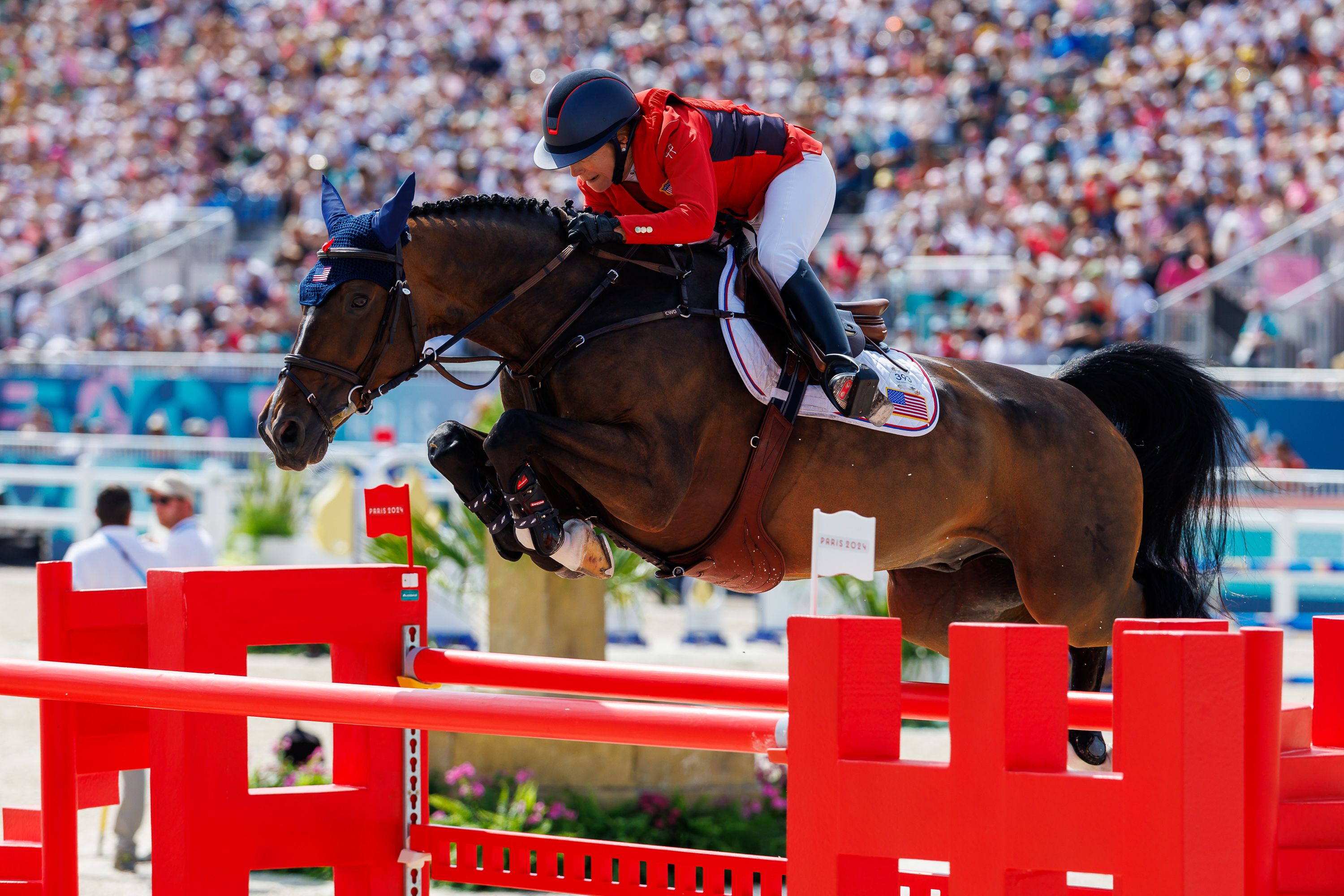
She likes to add strides with Baloutinue rather than take them out. “That suits him best but you really couldn't add going to the water and I had so much momentum built up that then I thought I'd really love to have six to the next one but that would have interrupted it so much so I felt like I was in a jump-off actually - like he was flying! So I had to settle him back down after that and he was perfect!”
Late call-up
Second in for Team USA, Karl Cook and Caracole de la Roque got a late call-up when Kent Farrington’s Greya was withdrawn. And the new pair more than lived up to expectations when posting the second American clear of the day in spectacular style.
“It's what we were mentally preparing for. We decided the right strategy was to prepare like we were jumping even if we weren’t. I came with blue pants but I packed everything as if I was showing. I had to do it like that so it was easier if I got called with two minutes to go”, he explained.
Compatriot McLain Ward’s single error was at the vertical at fence eight, and only one other horse/rider combination hit that one. He also picked up two time faults with Ilex but he was still pleased with their performance.
“I was thrilled. I mean, I knew going in that we had a pretty big margin of error so I made a plan to just be a little conservative and make sure there wasn't a big blow up. It was a very light rub at the fence, but not a big deal and I think all the team performed brilliantly and look very good going into tomorrow morning when everything starts from zero again”, he said.
Very pleased
Meanwhile the German trio were understandably very pleased with their own performances. But Philipp Weishaupt was careful to point out that when it comes to the team podium tomorrow it’s not over until it’s over . . .
“I really feel like we are strong, but everything can happen. There's another eight, nine, teams and it would be no surprise if they are winning so it can go any which way. But in general, we’re in very good shape”, he said.
All three of the German team know Weishaupt’s horse, Zineday, extremely well. “He was ridden as a four and five-year-old by Richie (Richard Vogel) and as a six and seven-year-old by Christian (Kukuk)”, said the man who steered Zineday to individual silver at last year’s European Championship.
Vogel’s United Touch is another of the big talking horses of the sport and today once again the 12-year-old stallion put on a stunning performance. His power over a fence is breath-taking but controlling that has been the biggest challenge for his riders. So what is the plan going into the team medal-decider tomorrow and how did Vogel think it will play out?
“Probably Christian is going to start first, he has the quickest horse and he likes to be in that position and then it's either Philipp or me going next. So that's not decided yet. All riders performed well today. I think all three German rounds were smooth so that makes us optimistic for tomorrow. But we're also aware that it starts from zero, and besides a good starting position there's not so much achieved yet - we will see!”, he said.

